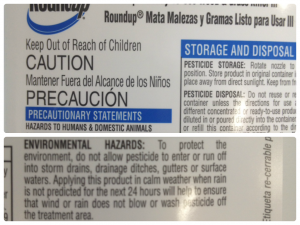why organic matters
Amidst the overabundance of dietary advice you may have come across, the common thread seems to be that eating lots of fruits and vegetables is a pretty good idea. We may be clever, but we’re not the only species that has this concept figured out, which means that sometimes (despite our best efforts) we have to share.
Since the advent of agriculture, a portion of the season’s crop has inevitably been lost to the category of life we refer to as “pests”. But while they may seem like a nuisance, they are actually a vital part of life’s design, an intricate ecological system which has developed over millions of years. When the parts of this process we deem less useful (bugs, grasses, etc.) are present, some of the crop will be forfeited and we will end up paying a little more so our farmers can still get their fair share. As a recurring theme, when nature interferes with Industry’s ability to turn a profit, we will do whatever it takes to manipulate that system to our advantage.
To avoid having to deal with the factors of growth that get in the way of our finished produce, humans have turned to chemical assistance. By showering our crops with herbicides, insecticides, and fungicides (cide coming from the Latin cida meaning “killer”) we have found a way to get to the finished commodity without having to deal with all those pesky invaders.
The most prevalent herbicide used on our plants in the US is glyphosate, discovered and brought to the market by Mansanto in 1970 under the name “Roundup”. Its widespread use has contributed to the engineering of Genetically Modified crops (also patented by Mansanto) that are “Roundup Ready”, meaning that they are able to withstand heavy spraying that would otherwise kill them, along with the unwanted weeds. As weeds are determined (like all life) to survive, more and more glyphosate must be sprayed to combat herbicide-resistant pests; a good thing for Mansanto, not so good for farmers and plant eaters. Glyphosate has been linked to several dozen health conditions, and there is now evidence that its use is responsible for the dramatic increase in kidney disease seen around the world. The chemical works by inhibiting an enzyme that is only found in plant and micro-organisms (like the ones found inhabiting our digestive tracts).
Atrazine, another herbicide, continues to be the second heaviest used chemical in US agricultural production, despite the controversy surrounding its safety. It is a known endocrine disruptor that contaminates our water supply, and for these reasons its use has been banned in the EU. It is associated with high rates of breast and prostate cancer, as well as decreased fertility. Its endocrine disrupting abilities are so strong that even low levels have been shown to trigger sex reversal in frogs. Yes, you read that correctly- male frogs changed into females after exposure to the stuff.
Chemicals sprayed on conventional crops are poison, but they are allowed to be sprayed because the regulatory bodies in our country have decided that low levels of these poisons are safe for human consumption. While its true that eating an apple sprayed with pesticides won’t induce acute toxicity, it will contribute to a gradual build-up in our bodies. With daily exposure, these toxins accumulate in our systems, and when given to animals, the chemicals can be magnified through the food chain in a process called bioaccumulation.
This “safe” level of pesticide residue has been calculated by the EPA according to full grown adult bodies, not the bodies of small children. So levels that might be “safe” for you and I haven’t been tested on children whose internal organs are still developing, and whose detox systems are not fully matured.
At any given moment in history, people have lived in the most current, and up-to-date society that ever existed. But we shouldn’t be so presumptuous to think that we’ve got it all figured out just yet. At one point in time the health of cigarettes wasn’t questioned, and particular brands were “recommended by doctors”. We have the advantage of hindsight to grasp the ridiculousness of this now, but that’s harder to do when you’re living in the moment.
From 1950-1980 1.35 billion pounds of an insecticide known as DDT was used in agricultural production. Initially, the EPA stated that the chemical “was not an imminent danger to human health and wildlife”. We now know that DDT causes cancer, and its use in agriculture has since been banned in the US and most developed countries. It is important for us to keep in mind that progress is a continuum, and its probably not a bad idea to question it every now and then. Although we feel comfortable trusting in The Powers That Be, not everyone gets it right the first time around.
Perhaps low levels of toxins don’t have any effect on our health. Perhaps the fact that they accumulate in our air, rain, groundwater, soil, and bodies isn’t really that big of an issue. But perhaps we will look back to this most current moment in history and wish we’d asked more questions.




It’s scary isn’t it! I try and buy 100% organic, occasionally I can’t. I feel concerned about the exposure of the earth and the farm workers as well as me the consumer. There are all sorts of arguments about why we need the chemicals, and believe me I’ve heard them all (my in-laws are conventional mango farmers) but at the end of the day it’s all about money.
yes, I feel for the farmers most of all as their continuous direct exposure presents more of a health risk than the general public. http://www.farmworkerjustice.org/content/pesticide-safety